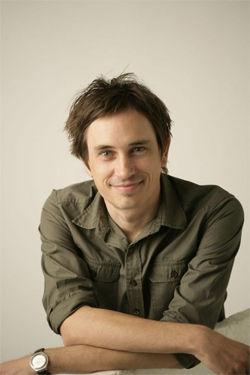 Trent Dalton [pictured right] is the best feature journalist in Australia. I first had this realisation sometime in 2005, during my final year of high school. That year, Queensland newspaper The Courier-Mail launched its new glossy magazine, Qweekend, which was included in the Saturday paper. Each week, the magazine ran three feature stories written by journalists in Queensland, as well as the occasional piece syndicated from overseas publications. From the beginning, the magazine’s editorial policy divided its attention between big, complex issues, and profiles of remarkable people doing worthwhile things with their lives.
Trent Dalton [pictured right] is the best feature journalist in Australia. I first had this realisation sometime in 2005, during my final year of high school. That year, Queensland newspaper The Courier-Mail launched its new glossy magazine, Qweekend, which was included in the Saturday paper. Each week, the magazine ran three feature stories written by journalists in Queensland, as well as the occasional piece syndicated from overseas publications. From the beginning, the magazine’s editorial policy divided its attention between big, complex issues, and profiles of remarkable people doing worthwhile things with their lives.
Qweekend has since built a reputation for exhibiting the state’s best feature journalism, and, by extension, its best feature journalists. Like Trent Dalton, who has been at the magazine since the beginning. Over the years, I’ve found myself continually drawn to Trent’s distinctive style of storytelling. It’s a habit I’ve been unable – and unwilling – to kick. The man has a freakish knack for crafting engaging, long-form narratives. I covet and cherish his words more than those written by any other Australian journalist. If I can become half as good a writer as Trent, I’ll die happy.
Last month, Trent Dalton won the News Award for 2010 Features Journalist of the Year for the second time, having previously won the award in 2008. This time around, judges paid special attention to two interrelated stories named Story of a Man and Story of a Woman. You can read them both by clicking on the story names, or by clicking on the images below. (Both links open the stories as PDFs in a new window.)
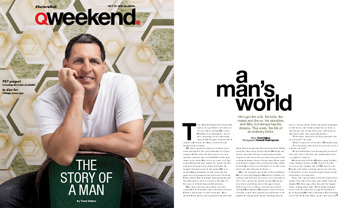
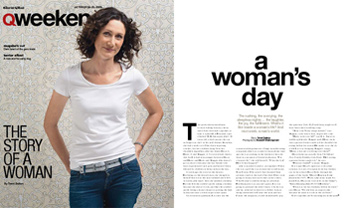
Last week, I interviewed Trent specifically about these two award-winning stories. I highly recommend reading both stories before reading my interview.
++
Andrew: Tell me about the process behind the News Awards. Did you nominate your own stories?
Trent: Yeah. So what happens is every year News Limited runs their national big news awards for all their publications, and so in the feature writing category you submit what you consider to be your five best stories, written throughout the year. I submitted what I thought my five best were. One was an interview with a child pornographer. Another one was an interview with a guy who was imprisoned in Brisbane for 20 years, and believed he was innocent. There was another one on euthanasia, and another one called Home Truths, which was about these boys out at Riverview Boys Home who were chronically abused when they were children. But now they’re 60 years old, and they had a reunion out there which they invited me to, and it was an incredible moment.
The other one was a combined, two-part story, Story of a Man / Story of a Woman, which got great feedback. And that was the one that the judges highlighted.
You write a lot of stories. Do you find it hard to pick favourites?
It definitely wasn’t hard to put in the pair that the judges responded to, Story of a Man / Story of a Woman, because that was also my favourite thing that I’ve done this year. It was probably the first pitch that I gave to my editor that’s come out exactly as I’d hoped it would in the genesis of the actual idea.
The pitch to my editor was: let’s do a story on a woman and a man, a completely ordinary woman and completely ordinary man, but tell their entire life story. Go up to them and say, “I want to know every last thought that is in your head, and I need you to be as honest as humanly possible.” I asked about hundred strangers in the street if they would be willing enough to share their stories, and everybody said “that’s a wonderful story but I’m not going to be the volunteer who gives you my entire life story, warts and all”.
Luckily, there was this extraordinary woman called Liz Parr. She got the ball rolling. She said “yep, that’s a great story and I really want to do this, I think it’s going to be great.” She wanted to do it for womanhood, and she took it in the spirit that I was trying to do it. It was an amazing trust exercise, because she totally told me everything, from her hopes and fears and dreams, to literally her sex life and some of the misfortunes she’s had in her life. It was amazing. It turned out to be a really great journalistic experience. It wasn’t hard choosing those ones.
All Qweekend stories have headings at the top of the page; the heading for these stories was ‘real life’. Did Christine [Middap, Qweekend editor] go for it immediately? It seems like going for this story might have been a bit of a risk for her.
Yeah, she did go for it immediately, but only because she knew what Qweekend has been thriving on. This is where I think we’ve developed an audience; we’ve thrived on the stories of ordinary people. We have this column called Ordinary People which we started five years ago, and without a doubt, we get the biggest response from that column, more than any other regular feature in the magazine.
It’s really connected with readers, so if it wasn’t for that column being successful, I think she might have balked at the idea. But given the success of that, she was like “Yeah, I can see the power of this,” and she knew where I wanted to go with it. She knew too that it would take finding the right people; it could have failed abysmally if we didn’t get that right people. It totally taught me the power of finding the right subject in any story that one might be writing. The right person, not just the right topic, but the right human being to actually be the conduit for the reader.
Qweekend has been around for five years now. When did you first come up with the story idea?
Around three years into it. I had the idea for a long time and I mentioned it once before to Christine, and then I got put on a really big story. It was a difficult story that took up a long time, and then I came back to it. Then I was chasing down someone to interview and that person couldn’t do the interview for a certain amount of time, so I needed a stop-gap and said, “Christine, what about this idea I had, about a man and a woman?” She said, “Yeah, let’s do that.”
The man and the woman stories ended up being way more interesting than the story about the guy that I was chasing down, who was holding off on the interview. You never know what’s going to work. It was something I’ve definitely always wanted to do; an epic about just an ordinary person’s life, because I honestly think the person walking past you, any given day, is just as interesting as Tom Cruise… well, not anyone is as crazy as Tom Cruise, but that idea that every human being has an amazing story to tell; it’s just about how much they want to share with you to get to that amazing story.
Where did you find Tony and Liz?
Liz was in Indooroopilly Shopping Centre, and I found Tony [Mitchell] in the western suburbs, out where I live, near Darra. He lived out at Richlands, so I was just walking around the shops there and I stopped him and said “Mate, how do you feel about this idea: I want to tell every last bit about your whole life story?” He laughed. And he was a completely courageous guy as well. He’s a normal, blokey type guy and he just said “Yep, I want to do it.”
He wanted to do it because it was a document for his kids, that idea of: where else do you get someone to write 4,000 words about your life? He was like, “why not?”. And it was totally his life up until that point in time, for better or worse. In his case, it was a completely, amazingly beautiful life, but with moments of such tragedy for him, and moments of doubt. But he was such a brilliant man. I admire him so much because he was willing to share that stuff. I couldn’t tell you how many readers wrote in saying “Tony inspired me to no end because it reminded me of my dad,” or “it reminded me of my brother,” or “it completely reflected my life story.” Seemingly an ordinary guy from Richlands turns out to inspire people; that’s pretty amazing. That was really something great to come out of it.
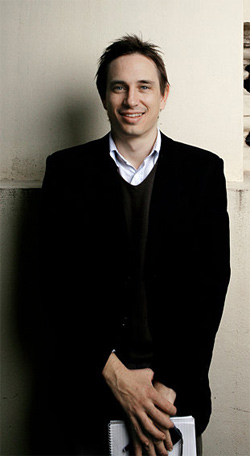
Did you censor anything?
I censored some elements about Tony’s relationships and things, but not to protect Tony, because Tony was more than willing to share aspects of his life. But having a sense of the people that he’s talking about. That was it, which is something we’re always running across, and I’m always getting in trouble with our lawyers because I’m inadvertently defaming someone through a quote that someone has said something about someone, perhaps an ex-wife, or cousin, or anything.
It’s not saying that Liz or Tony said horrible things about anyone, but as a general thing, this happens to me all the time when someone might be bagging a relative or something, but the relative will be able to identify themselves in that. All the person’s other relatives will be able to identify that person, therefore I am defaming them, and I could get in massive amounts of trouble. There is always so much censoring that goes on, and a lot of times it’s to get me out of trouble. Which is great.
Both stories centred around the home. Did you spend a lot of time in their homes?
Yeah, totally. I spoke for a long time on the phone with both of them, preparing ourselves, readying for this one day. The idea was building up a relationship of trust with them for a couple of weeks, and in the event that I would be able to focus on one day in their home, in their ordinary lives, and it would be sharing every aspect, crystallised within one day. It was definitely that idea of home life: what goes on behind the closed doors? Any story I’ve ever written has been, like: the person’s out doing something, and you never really find out about what is actually happening in the person’s home, because it’s such a personal place.
That was the concept. It was like: what happens in the home? And then: can we describe that in an exciting way or some sort of way that might be interesting, just the minutiae of life in the home. Can that be interesting? Can that be enlightening, and have bigger repercussions, or add bigger meaning to something?
It really did get down to the more routine, mundane aspects of life. I remember the moment in Liz’s story where there’s a hole in a strawberry, and all the kids crowded around looking at it. It’s such a tiny aspect of the story, but it’s interesting and fascinating.
Thanks for the observation! I love that stuff, from the writing perspective, that you can capture in a factual piece something truly beautiful and eloquent, just this little moment in time. I love little moments in time, that’s my big thing. I’m writing to moments of time this year; I’ve just been writing a lot of moments in time, and it’s been cool because I love that concept that life is just a series of wonderful little moments in time. That strawberry moment was this beautiful moment; the cutest little kids marvelling over a hole in the strawberry.
Have you re-read the stories recently?
I have, because to go in the awards entries, you re-read it and write about your thoughts on it and give insight into how it developed, and all that. I have re-read it and I really enjoyed it. Whenever I re-read anything with a certain amount of time in between… actually, it doesn’t even have to take time. It could be from the time I submit it to my editors to the time it’s actually printed on the page. I shudder when I read it on the printed page. You feel like, “that sounds a bit too strong” or it’s a bit too ham-fisted, because at the time you’re writing it, you’re getting swept up in the freight-train vibe of the story, and you’re not detached enough. All it takes for me to get detached is about a week’s time of not thinking about the story, and then you go back to it and you go “Oh no! I shouldn’t have written that. That sentence doesn’t work at all,” but you’re probably overly critical.
Those two stories were one of the few times I’ve gone, “I’m really quite proud of how that stands up,” in hindsight, whereas some of the other stories that I entered into those awards I thought, “I probably could have done that a bit better”. The other ones were a little bit more complicated in the sense they all had a million different sources and all that; the complexity of a normal big feature article. The beauty of those two stories, Story of a Man and Story of a Woman, though, was that there was only one person that was really driving the story. That made it much clearer, and it was a joy to write. It was a real joy to write those.
When those days of observation were taking place, were you framing the stories in your head? Did you see certain moments that would fit well, in the structure of the story?
Absolutely, yeah. That stands for anything I write. They’re the ones that I write in my notepad and I put massive asterisks next to them, saying ‘this was key’; ‘this was some amazing key moment’. That day in Story of a Woman, Liz’s children mapped out the day. By focusing on a day, already you had a natural structure to a story, because it could start very early in the morning. I got around there at about 6am and it went until about 6pm. It had a great, natural structure to it, and then you could blend in Liz’s life story among all those daily things.
Along there, there’s that idea of narrative payoffs. There are these in-built narrative payoffs. For example, she makes lunch in the morning and then you know that that lunch is going to come back into the story later on, because it naturally will; either the kids won’t eat their lunch, or she won’t ever get to eat her lunch, or a fly’s going to land on the lunch. You just know, so you make sure you take notes that the sandwich is going to come back into it. Take note of what’s on the sandwich, because it’s going to logically have a good, narrative payoff later on! [laughs]
Did you show drafts to your subjects before you submitted?
That is a great question, because if ever there was a story that probably the subject did deserve to see, because they were giving so much of themselves, it was this one. But it’s a really strict policy where I work at The Courier-Mail and on Qweekend; you can’t show the story to the subject. Oftentimes I call them and go through it with them. Maybe there’s flexibility there, or maybe there should be, because it’s kind of a nice… people want to have that access. If they’re giving so much of themselves, maybe they deserve to see and protect themselves.
I called them up and said on the difficult areas, “This is where it’s going,” but they were really good in the sense that they said “Just write it.” They knew what it was about, and they said, “this is my life”. Even during the interview, if they were talking about a delicate thing, you might stop and say, “Do you mind if we talk about that for the story,” and they might think about it and go, “Yeah, right, let’s talk about it, let’s go there.” To answer your question, no, I didn’t show them beforehand.
Liz told me that when she picked it up, it was really confronting for her. It was really hard for her [to be] picking it up; she was like “Wow! It’s really out there.” She knew it was going to be real, but it was really real. She was like “wow”. And it’s hard on her husband too; the really lovely husband she has. It’s hard to share that much of yourself, but Liz has since said she totally feels like it was really worthwhile because she’s got so much wonderful feedback from other women, and it tapped into something out there.
She still stands by it, she’s really glad she did it, and I’m so glad that she feels that way. I’m so glad she doesn’t regret doing it, because so often as a journalist you feel so bad. That’s the great dilemma that keeps me up at night. I really lose sleep over the idea that you’re telling someone’s story; that you’re taking the stories and putting them out there. You’re exposing their vulnerabilities. It’s one of the harder aspects of the job.
Anyway, I’m sounding like a tosser; it’s not all that… you’re being very indulgent! But that is a real concern, that side of things.
What about Tony? Was he happy with it?
He’s right down the line, in the sense of “it is what it is”. His wife had to read it – she sent me an email afterwards. She said “Trent, thank you for the story.” She hated it the first time she read it, and then she said “I really liked it on the second time.” So I’m so grateful she gave it a second reading, because I’m sure that first reading would have been “Oh no!”. It would have been all bad, because he shared too much. But I’m happy that on the second reading, she felt some of the power of it.
Was it harder to write than some of your other work?
Probably one of the easiest to write, and that’s a great indication of the power of the story for me. Sometimes the stories that I don’t quite hit a home run on… I should change that. I hate using American terms. I’m going to say ‘hit a six’; we use too many American terms now, just in general parlance.
What I’m trying to say is, the ones that you struggle writing often turn out to be the ones that a reader struggles reading. So often the ones that are easy to write just flow. That saying – ‘they write themselves’. Both of those stories did, because the subjects just gave such wonderful material.
You nominated your five stories, and then you were shortlisted. And then on the night you were given the award.
Yeah.
There’s a photo of you holding a statue and proclaiming something from the platform [pictured below right]. What were you saying?
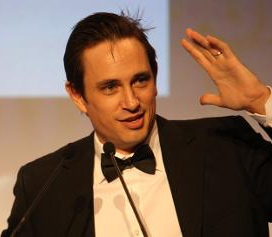 Probably saying how amazing my fellow finalists were. There were three finalists from Qweekend, which is fantastic. It was a great coup for Queensland writers out there. It was really wonderful. Basically I’m saying “I can’t believe I’ve got this!”, because those two writers I was nominated with – Matt Condon and Amanda Watt – are absolute inspirations, and heroes of mine.
Probably saying how amazing my fellow finalists were. There were three finalists from Qweekend, which is fantastic. It was a great coup for Queensland writers out there. It was really wonderful. Basically I’m saying “I can’t believe I’ve got this!”, because those two writers I was nominated with – Matt Condon and Amanda Watt – are absolute inspirations, and heroes of mine.
I was saying something along the lines of that, and then following it up with saying how amazing my wife Fiona is, because she’s the one at home looking after the kids for the past three years, and indulging me all those times at midnight, when you should be saying romantic things, and I’m saying “What do you think about this for an introduction?” She’s like: “Stop talking about writing!”
Would you say you’re becoming more obsessive about writing as your career progresses?
Yeah, definitely. It’s gotten to the point now where, when my wife and I go on holiday, I’m not allowed to bring a notepad and I’m not allowed to bring my laptop.
Wow. Where do you keep your ideas?!
I know; you have to write then down on serviettes and things, and secretly stash them into your pockets! It’s getting really bad! Really embarrassing. And it’s become a massive issue in our home. I’ve been really conscious of it because that idea of being present for your partner, and not thinking about a story or some sort of storyline, some way of saying a sentence or something, some little gem of an idea. You just go, “this is ridiculous – my family life is way more important than this”.
As much as I love writing for Qweekend and writing stories and stuff, it’s nowhere near as important as having a really great relationship with your partner, and with your kids. So I’ve been really conscious. I’ve got countless notepads of just scribbles, to the point where you wake up in the middle of the night and you’re reaching for a notepad. It’s embarrassing, ridiculous. But it’s all good.
Well, you’re well aware of how inspirational you are to me as a writer, and I’m sure I’m not the only one in Brisbane – let alone in Queensland – who feels that way. So congratulations on the award, Trent.
Man, thank you so much Andrew. People like you inspire me. I’m not just backslapping; people like you inspire me because it reminds me of the fire. It keeps the fire alive and I think it’s wonderful that there’s a community out there, particularly in Brisbane. If there’s one thing that comes from awards like this, it’s to show that yes, great writing is happening here in this state, and it’s going to continue. That all those people look up from Melbourne and Sydney and go, “yeah, there’s some great stuff going on”.
Cool. I’ll leave it there.
Thanks for indulging me!
++
To keep track of Trent’s feature writing, pick up The Courier-Mail each Saturday for the Qweekend magazine, or keep an eye on the Qweekend website, which is updated each Monday with feature stories from the latest issue. You can also follow Qweekend on Twitter.
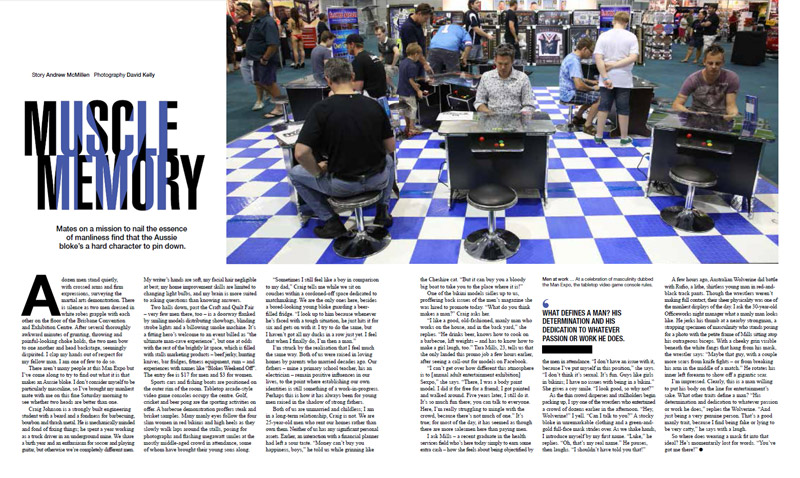
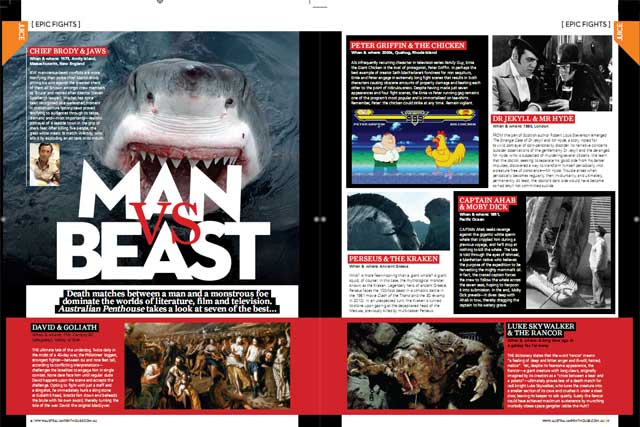
 Trent Dalton [pictured right] is the best feature journalist in Australia. I first had this realisation sometime in 2005, during my final year of high school. That year, Queensland newspaper The Courier-Mail launched its new glossy magazine,
Trent Dalton [pictured right] is the best feature journalist in Australia. I first had this realisation sometime in 2005, during my final year of high school. That year, Queensland newspaper The Courier-Mail launched its new glossy magazine, 


 Probably saying how amazing my fellow finalists were. There were three finalists from Qweekend, which is fantastic. It was a great coup for Queensland writers out there. It was really wonderful. Basically I’m saying “I can’t believe I’ve got this!”, because those two writers I was nominated with – Matt Condon and Amanda Watt – are absolute inspirations, and heroes of mine.
Probably saying how amazing my fellow finalists were. There were three finalists from Qweekend, which is fantastic. It was a great coup for Queensland writers out there. It was really wonderful. Basically I’m saying “I can’t believe I’ve got this!”, because those two writers I was nominated with – Matt Condon and Amanda Watt – are absolute inspirations, and heroes of mine.